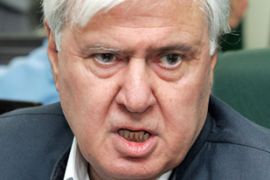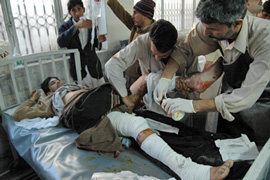Arrests after Pakistan mosque blast
Police hunt for clues and suspects after Friday’s attack killed at least 50 people.

Published On 22 Dec 2007
Gulzar Ahmed, a local police officer, on Saturday said: “We are probing locally and a team of experts is conducting a high-level investigation into the incident.”
Local police said the head of the suicide bomber had not been located but that two severed legs believed to be his were being sent for DNA tests.
The attack on the Muslim holiday of Eid al-Adha sparked anger and fears of further attacks should Pakistani forces crackdown on fighters in the frontier region.
It also deepened the sense of uncertainty in Pakistan ahead of January 8 parliamentary elections, which Sherpao is contesting.
| In Video |
Kamal Hyder, Al Jazeera’s correspondent in Pakistan, said: “It was widely expected that there would be attacks against Aftab Khan Sherpao.”
Besides being blamed for a security crackdown on armed tribal groups, many hold him responsible for the assault on a hardline mosque in Islamabad in July.
“Many people hold him personally responsible for what happened in the Red Mosque … he had been warned there would be revenge attacks,” Hyder said.
Condemnations
Shortly after the bombing, Robert Gates, the US defence secretary, said that al-Qaeda had “re-grouped” along the Afghan-Pakistan border.
Suspicion for the blast was expected to focus on pro-Taliban and al-Qaeda fighters active in the North West Frontier Province.
Pervez Musharraf, Pakistan’s president, condemned the blast and directed security and intelligence agencies to track down the masterminds, the state-run Associated Press of Pakistan reported.
The UN and US also condemned the attack.
Sean McCormack, a US state department spokesman, said: “Violence for political gain is never justified, and is even more disturbing during such a special holiday in the Islamic faith.”
‘Reprisal attacks’
 |
| Scores of civilians were also injured in the attack [Reuters] |
Tariq Azeem Khan, a Pakistani senator, told Al Jazeera: “I think that this is a direct fallout from what is happening in Afghanistan and our own position on the war on terror.
He said more such attacks may be a possibility in the run-up to elections.
Imtiaz Gul, a political analyst, told Al Jazeera that the message from the attack was “that all those people associated with the war on terror, the policy makers, the decision makers, and those who are involved in the implementation, they are the obvious targets of the militants”.
“Only political dialogue with the militant forces or these who support these forces perhaps could bring about any change and contain these attacks.”
Source: Al Jazeera, News Agencies
